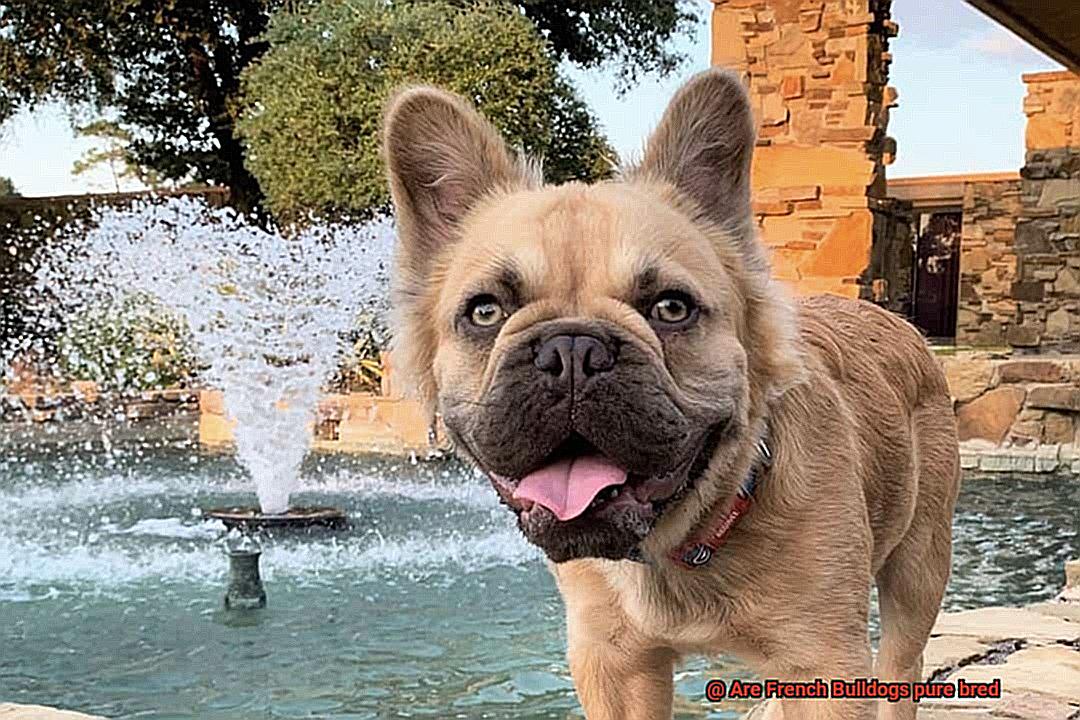Are French Bulldogs pure bred?
Welcome to our latest blog post all about those adorable French Bulldogs. These squishy-faced pups have stolen the hearts of many with their unique charm and one-of-a-kind personalities.
But here’s the burning question: are French Bulldogs truly pure bred? Well, fear not, because we’re here to shed some light on the matter.
So, grab a cuppa, get cozy, and let’s dive into the world of these lovable little companions that have taken the world by storm.
Examining the Pedigree for a French Bulldog
Contents
- 1 Examining the Pedigree for a French Bulldog
- 2 Unregistered French Bulldogs and Mixed Ancestry
- 3 How to Ensure You Have a Purebred French Bulldog
- 4 The Benefits of Owning a Purebred French Bulldog
- 5 Common Health Issues in Purebred French Bulldogs
- 6 Tips for Choosing the Right Breeder for Your French Bulldog
- 7 What to Look For in a Reputable Breeder of French Bulldogs
- 8 Questions to Ask Before Buying a Purebred French Bulldog
- 8.1 Can you provide the dog’s pedigree certificate?
- 8.2 How long have you been breeding French Bulldogs?
- 8.3 Are you part of any breeding associations or organizations?
- 8.4 Have the parents undergone genetic health tests?
- 8.5 How do you socialize your puppies?
- 8.6 Do you offer any guarantees or warranties?
- 8.7 Can you provide references from previous buyers?
- 9 Conclusion
French Bulldogs have become one of the most popular dog breeds, known for their adorable appearance and friendly nature. However, when it comes to determining whether a French Bulldog is truly purebred, things can get a little confusing.
In this article, we will delve into the key factors that you should consider when examining the pedigree of a French Bulldog, so you can have peace of mind knowing that your furry friend is indeed a purebred.
Confirming Both Parents:
To ensure the purity of your French Bulldog, it’s essential to verify that both the mother and father are also French Bulldogs. Breeding two different breeds would result in mixed-breed puppies, which means your French Bulldog may not meet the strict standards set for the breed.

The Power of Champion Bloodlines:
Champion bloodlines add an extra layer of confidence in the purity of your French Bulldog. These bloodlines indicate that the dog’s ancestors have excelled in dog shows and competitions, demonstrating their adherence to breed standards and good health. While champion bloodlines don’t guarantee a purebred, they certainly increase the likelihood.
Generations in the Pedigree:
The pedigree should provide you with information about at least three generations, but ideally, you should aim for five or six generations. The more generations documented, the better understanding you will have about potential genetic issues or health concerns that may have been present in previous generations.
Reputable Breeders:
Researching reputable breeders is crucial when examining a French Bulldog’s pedigree. These breeders prioritize maintaining breed standards and carefully select mating pairs to ensure the purity of their puppies. They can provide detailed information about your dog’s lineage, including health records and certifications.
Cross-Referencing Documentation:
While pedigrees are valuable, occasional errors or omissions may occur. Therefore, it’s recommended to cross-reference the pedigree with other available documentation, such as registration papers, health certificates, and DNA tests. This backup verification can give you added confidence in your French Bulldog’s pedigree.
Unregistered French Bulldogs and Mixed Ancestry
If you’re in the market for a French Bulldog, it’s essential to understand the potential risks associated with unregistered dogs and mixed ancestry. While these dogs can still make loving and wonderful pets, their genetic background may come with uncertainties. Here are a few key points to consider:
- Lack of Verification: Unregistered French Bulldogs lack documentation from a recognized kennel club, making it challenging to verify their breed purity. Without proper papers, you cannot be certain if your dog has a purebred lineage or if there is mixed ancestry involved.
- Popularity and Irresponsible Breeding: The popularity of French Bulldogs has led to an increase in irresponsible breeding practices. Some breeders may not be registered or follow proper guidelines, resulting in unregistered dogs with mixed ancestry. Breeding French Bulldogs with other breeds to meet demand can compromise their genetic integrity.
- Outcomes of Mixed Ancestry: Unregistered French Bulldogs with mixed ancestry can exhibit variations in appearance, temperament, or health issues associated with the other breed involved. These outcomes can be unpredictable and may not align with the expectations of those seeking a purebred French Bulldog.
- Accidental Breeding: Even responsible owners or breeders can unintentionally allow their French Bulldogs to mate with another breed, resulting in puppies with mixed ancestry. Accidental breeding can occur when dogs are not properly supervised or kept away from potential mates during periods of fertility.
To ensure the purity of your French Bulldog’s breed, it is recommended to acquire a puppy from a reputable breeder who can provide proper documentation and pedigree information. Registered breeders follow strict guidelines and adhere to breed standards set by kennel clubs, ensuring that their puppies have a purebred lineage.
By obtaining a registered French Bulldog, you can have confidence in the dog’s genetic background and reduce the risk of unexpected surprises. Remember, while unregistered French Bulldogs with mixed ancestry can still be great pets, it’s important to be aware of the potential uncertainties that come with their genetic background.
If you are considering adopting or purchasing an unregistered French Bulldog or a dog with mixed ancestry, make sure to research the breeder thoroughly and ask for as much information as possible about the dog’s background. A responsible breeder will be transparent and provide accurate information about the dog’s lineage.
How to Ensure You Have a Purebred French Bulldog
This is a common question that many people have when considering adding a French Bulldog to their family. To determine if a French Bulldog is pure bred, it is important to understand what it means to be a pure bred dog.
A pure bred dog is one that comes from parents of the same breed and has a documented pedigree that traces back several generations. In the case of French Bulldogs, this means that both parents should also be French Bulldogs. Reputable breeders will provide documentation that shows the lineage of the dog, including information about its parents, grandparents, and so on.

However, not all French Bulldogs have official registration papers. This could be due to various reasons, such as the dog being from a non-show quality lineage or being adopted from a rescue organization. It’s important to note that even if a French Bulldog does not have registration papers, it does not mean they are not pure bred.
Sometimes, French Bulldogs may have mixed ancestry, meaning they have genes from other breeds in their lineage. This can happen when breeders try to introduce new traits or improve certain characteristics in the breed. While mixed ancestry doesn’t necessarily mean a French Bulldog is not pure bred, it does raise questions about the dog’s lineage and whether it meets the strict standards set by breed organizations.
If you are considering getting a French Bulldog and want to ensure that it is pure bred, it’s recommended to do thorough research on reputable breeders who can provide proper documentation and transparency about their breeding practices. Consulting with experts or professional organizations dedicated to the breed can also help in understanding what to look for in a pure bred French Bulldog.
The Benefits of Owning a Purebred French Bulldog
You’ve decided to take the plunge and bring home a furry friend – a French Bulldog. But have you considered the benefits of owning a purebred French Bulldog? Let’s dive into why these adorable creatures are worth considering.
Predictable Appearance and Temperament

When you choose a purebred French Bulldog, you can expect your new companion to have predictable physical characteristics and personality traits. These dogs come from a long line of ancestors with similar traits, giving you a good idea of what to expect. From their distinctive bat-like ears to their compact bodies, purebred French Bulldogs have a unique and recognizable look that many people find appealing.
Health Assurance
Health is always a concern when it comes to our four-legged friends. By purchasing a purebred French Bulldog from a reputable breeder, you can have confidence that your dog has been bred with health in mind. Responsible breeders carefully select breeding pairs to minimize the risk of passing on genetic health issues. This can provide peace of mind and ensure that your furry friend will be by your side for years to come.

Well-Documented Pedigrees

Purebred French Bulldogs often come with well-documented pedigrees, allowing you to trace their lineage back several generations. This information can be fascinating for those who are curious about their pet’s heritage or who may want to participate in dog shows or competitions. Knowing your dog’s ancestry can also provide insights into potential health issues or behavioral traits that may be common in certain bloodlines.
Involvement in Breed-Specific Activities and Communities
Owning a purebred French Bulldog opens up opportunities for involvement in breed-specific activities and communities. Many purebred dog organizations offer events, clubs, and resources specifically for owners of certain breeds. By owning a purebred French Bulldog, you can connect with others who share your love and interest in these delightful dogs, opening up a whole new world of socialization, support, and fun.
Common Health Issues in Purebred French Bulldogs

We’re here to guide you through the common health issues that can affect our beloved four-legged friends.
- Brachycephalic Airway Syndrome: Picture this – your Frenchie panting after a game of fetch, tongue out, desperately trying to catch their breath. This is a classic sign of brachycephalic airway syndrome. Their squished faces and shortened air passages make it harder for them to breathe, especially during exercise or in hot weather. So remember, take it easy on those summer strolls and keep an eye out for any signs of respiratory distress.
- Skin Allergies and Dermatitis: Sensitive skin is not just a human problem. Frenchies are notorious for their delicate dermis, which can lead to allergies from food, environmental factors, or even pesky flea bites. Keep their skin healthy and happy with regular grooming using hypoallergenic products.
- Spinal Issues: Those short legs may be cute, but they also put our Frenchies at risk for spinal problems like intervertebral disc disease (IVDD). Excessive strain on their backs can lead to pain, paralysis, and mobility issues. So while they may have a Napoleon complex, it’s important to avoid activities that put too much strain on their precious spines.
- Eye Problems: The eyes are the windows to the soul, but for French Bulldogs, they can also be a source of trouble. Cherry eye, dry eye, and corneal ulcers are just a few eye conditions that can affect our furry friends. Regular eye check-ups with a trusted veterinarian are a must to catch and treat these issues early on.
- Reproductive Concerns: French Bulldogs may have a romantic reputation, but when it comes to reproduction, they can face some challenges. Females may struggle with pregnancy and labor due to their narrow hips and small pelvis, while males may experience fertility problems. If you’re considering breeding your Frenchie, make sure to consult with a veterinarian experienced in French Bulldog breeding.
Tips for Choosing the Right Breeder for Your French Bulldog
French Bulldogs, also known as “Frenchies,” are beloved for their adorable appearance and friendly personalities. If you’re considering getting a French Bulldog, you may be wondering if they are pure bred. Let’s take a closer look.
A purebred dog comes from parents of the same breed and has a documented pedigree that traces back several generations. For French Bulldogs, this means having both parents who are also French Bulldogs. Reputable breeders will provide documentation showing the lineage of the dog, including information about its parents, grandparents, and so on.
However, not all French Bulldogs have official registration papers. There can be various reasons for this. Some French Bulldogs may come from non-show quality lineages, while others may be adopted from rescue organizations that don’t have access to the dog’s complete pedigree.
It’s also worth noting that some French Bulldogs may have mixed ancestry. This can happen when breeders introduce new traits or try to improve certain characteristics in the breed. While mixed ancestry doesn’t necessarily mean a French Bulldog is not pure bred, it does raise questions about the dog’s lineage and whether it meets the strict standards set by breed organizations.
But here’s the thing
Whether a French Bulldog is pure bred or not doesn’t diminish their value or worth as a pet. Mixed breed dogs can make wonderful companions and may even have fewer health issues compared to purebreds, who are prone to certain genetic conditions.
If you’re specifically looking for a pure bred French Bulldog, it’s important to do thorough research on reputable breeders who can provide proper documentation and transparency about their breeding practices. Consulting with experts or professional organizations dedicated to the breed can also help in understanding what to look for in a pure bred French Bulldog.

What to Look For in a Reputable Breeder of French Bulldogs
If you’re considering adding a French Bulldog to your family, it’s essential to find a reputable breeder who can provide you with a healthy and well-bred puppy. Here are some key factors to consider when looking for a reputable breeder:
Proper Documentation and Lineage:
A reputable breeder will have proper documentation and proof of the dog’s lineage. This includes pedigree papers and registration certificates from recognized kennel clubs such as the American Kennel Club (AKC) or the United Kennel Club (UKC). These documents ensure that the dog is indeed a purebred French Bulldog and not a mix with another breed.
Health Clearances:
The breeder should be able to provide health clearances for both the parents and the puppies. This includes certifications for genetic disorders that are common in French Bulldogs, such as hip dysplasia, patellar luxation, and brachycephalic airway syndrome. Health clearances demonstrate that the breeder is taking the necessary steps to ensure that their breeding dogs are healthy and free from any hereditary diseases.
Clean and Well-Maintained Living Conditions:
It is important to visit the breeder’s facility or home to see firsthand how the dogs are raised. A reputable breeder will have clean and well-maintained living conditions for their dogs, with ample space for them to exercise and socialize. The breeder should prioritize the well-being and welfare of their dogs, providing them with proper nutrition, veterinary care, and regular exercise.
Responsible Breeding Practices:
Reputable breeders will also emphasize responsible breeding practices. This means they will not breed dogs too frequently, as this can put strain on the mother’s health. They will also limit the number of litters each female dog has in her lifetime. Additionally, a good breeder will carefully select suitable mates for their breeding dogs, ensuring that both have desirable traits and good temperaments.
Ongoing Support and Guidance:
A reputable breeder will always be available to answer any questions or concerns you may have about their French Bulldogs. They will provide ongoing support and advice even after you have taken your puppy home. Good breeders genuinely care about the well-being of their dogs and want to ensure that they go to loving and responsible homes.
By considering these factors and doing thorough research, you can find a reputable breeder who will provide you with a healthy and well-bred French Bulldog puppy. Remember, responsible breeding practices and proper care are essential in ensuring that your new furry friend will bring you joy and companionship for many years to come.
Questions to Ask Before Buying a Purebred French Bulldog
Before diving headfirst into the world of purebred French Bulldogs, it’s essential to find a breeder who is as dedicated to the breed as you are. To help you make an informed decision and avoid any potential pitfalls, here are some questions you should ask before bringing home your furry bundle of joy.
Can you provide the dog’s pedigree certificate?
A reputable breeder should be able to provide you with the necessary paperwork, including the dog’s pedigree certificate. This document is like a family tree for your Frenchie, showing their lineage and confirming their purebred status.
How long have you been breeding French Bulldogs?
Experience matters when it comes to breeding French Bulldogs. Inquire about the breeder’s expertise and reputation. A seasoned breeder will have a track record of producing healthy, well-tempered pups and will gladly share information about their breeding practices.
Are you part of any breeding associations or organizations?
Breeders who are part of recognized breeding associations or organizations demonstrate their commitment to responsible breeding practices. These groups often have strict guidelines that breeders must adhere to, ensuring the health and well-being of the dogs.
Have the parents undergone genetic health tests?
French Bulldogs are prone to certain genetic health conditions, such as hip dysplasia and brachycephalic airway syndrome. Responsible breeders take these tests seriously and will provide you with proof that the parents have been tested and cleared of these conditions.
Proper socialization is crucial for French Bulldogs, as it helps prevent behavioral issues down the road. Ask the breeder about their socialization practices and if they expose the puppies to different environments, people, and other animals.
Do you offer any guarantees or warranties?
Reputable breeders often provide health guarantees for their puppies. This means that if your Frenchie develops a genetic health condition within a certain period after purchase, the breeder will cover any veterinary expenses. Make sure to read and understand the terms of the guarantee before making a decision.
Can you provide references from previous buyers?
Talking to other people who have purchased a puppy from the same breeder can give you valuable insights into their experiences. Ask about the health and temperament of the dog they bought, as well as their overall satisfaction with the breeder and the buying process.
Conclusion
In conclusion, it is clear that French Bulldogs are indeed pure bred.
Their distinct characteristics and traits have been carefully preserved through selective breeding over the years. With their adorable bat-like ears, compact bodies, and friendly personalities, French Bulldogs have become a beloved breed among dog enthusiasts.
The dedicated efforts of responsible breeders ensure that these dogs meet the standards set by kennel clubs and breed associations.




